Project Timeline
From 2002 to 2018
2002
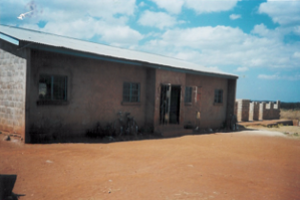
School as we first saw it in August 2002. It had two grubby classrooms and two unfinished structures which were used by 400 plus students.
2003
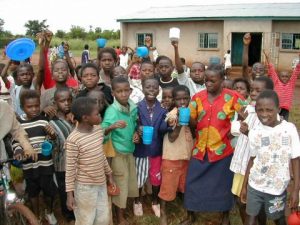
There were severe food shortages in Zambia in the first decade of this century and this combined with the AIDS epidemic meant the children were hungry and malnourished. We set up a food programme where the children got a bowl of Nshima (made from corn ground into a fine white powder called ‘mealie meal’)
2005
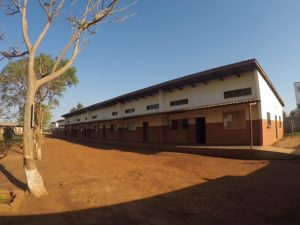
Irish Aid funded the building of 5 classrooms and the Irish Ambassador to Zambia, Mr. Mark Nolan opened the school in September 2005. We assisted with the furnishing of the classrooms and with their on going maintenance. Between 2005 and 2010, a kitchen, hammer mill and 4 more classrooms were added. Electricity and water services were connected in 2009, A library was build in 2012 and new toilet blocks in 2013.
2013
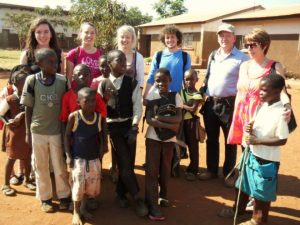
Five trainee teachers from St Patrick’s College, Dublin, volunteered at Linda Community School in 2013. They spent 3 weeks assisting the local teachers with Grade 5 and 6 pupils. The team came away with greater understanding of the difficulties the pupils and teachers encounter. Teachers lacked resources and facilities in the classroom and were not familiar with modern teaching methods. The pupils lacked the basic text books recommended for the subject.
2013
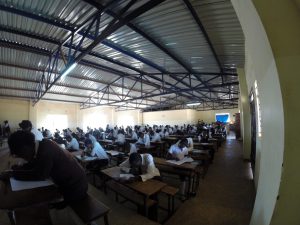
Community Hall, built by Vision Zambia, a partner NGO supporting the school. The Hall is used as an exam centre, for school and community events. It a major asset and amenity for the community.
2014
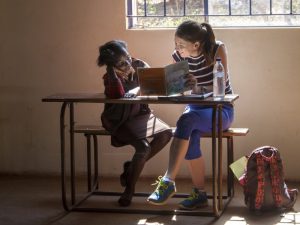
A second team of trainee students from St Patrick’s College, led by Laura Bergin (Laura set up ZOCS society at St Patrick’s to recruit volunteers for Linda Community school) spend 4 weeks volunteering at the school in 2014. With the learnings from their 2013 visit, the team focused on a rapid intervention programme on literacy for pupils labeled as slow learners. The programme was very successful and rewarding as they saw the confidence of their students grow daily.
2016
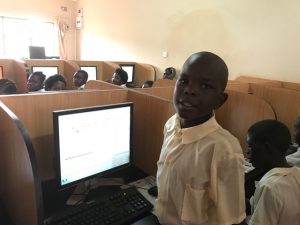
One classroom has been converted into a modern computer lab with 35 desktop computers and a surge-protected electricity supply.
These computers, purchased from Camara Ireland’s office in Lusaka, provide the ability to teach computer science, which is a mandatory subject for Grade 7 to 9 pupils. The computers are loaded with educational material recommended for the Zambian curriculum.
2017
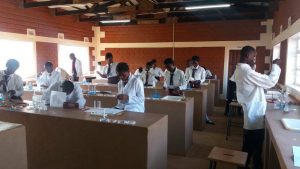
A science lab funded and managed by BuildIt International was competed in 2017. This is a modern lab equipped with sinks, water and gas to each set of tables. We assisted with the supply of stools and teaching aids. The lab will facilitate the teaching of science which is a mandatory subject from Grade 7 to 9.
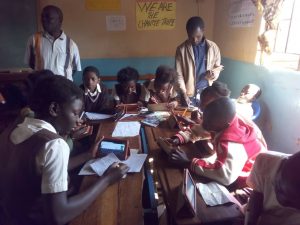
Eye Care
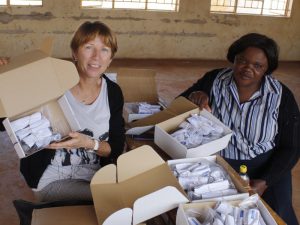
Frances and Leah sort glasses sent from Ireland. The glasses were sent following eye examinations at the school and community by a group of Ophthalmologists from Ireland. Poor eyesight is common in Linda Compound and those affected find it difficult to progress their education. It’s amazing to see the difference a basic pair of glasses makes and the positive impact it has on a child’s development.
Teacher training
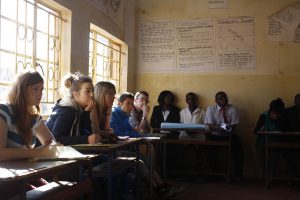
The trainee teachers from 2013 and 2014 held a number of training sessions with the teachers at Linda Community school.
The sessions included the exchange of ideas and experiences with teaching methods and classroom management. The Irish volunteers experienced first-hand the difficulty of managing and teaching a class of 70 or more students in a poorly lit and ventilated classroom. Combining this with limited resources and teaching aids – we can imagine how difficult it is. The trainee teachers did manage to exchange good ideas on finding resources locally and encouraged the teachers to use what is locally available and not rely on government supplied resources.
Library
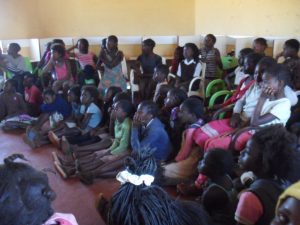
Lorna Finnegan and Tim Sellick donated moneys from their wedding for the building of a library at the school.
Above we see children listening attentively to a story being read by a volunteer from Ireland.
The library provides a sanctuary for reading but its a significant challenge to get teachers and pupils to use it to its full potential, as both teachers and pupils have poor literacy capabilities. Acceptance of donated books needs to be managed carefully and it’s more cost effective and beneficial to stock the library with books relevant to Zambian life and culture.
Teacher scholarships
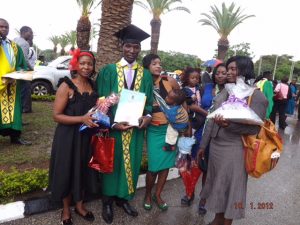
We funded 4 students on third level scholarships including teacher training. When the trainee teachers graduated they were sent to government schools. Through extensive lobbying we managed to get 19 government paid teachers allocated to the school in 2012. We have the same allocation today and are lobbying for more.


